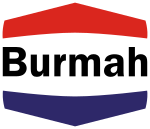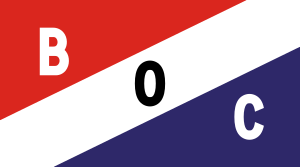Burmah Oil facts for kids
 |
|
|
Formerly
|
Burmah-Castrol (1966–2000) |
|---|---|
| Public | |
| Industry | Petroleum |
| Fate | Merged to BP in 2000 |
| Successor | BP |
| Founded | 1886 |
| Defunct | 2000 |
| Headquarters | Glasgow, Scotland |
| Brands | Castrol (1966–2000) |
| Subsidiaries | Anglo-Persian Oil Company |
The Burmah Oil Company was a major British company that worked with oil. It was once one of the most important companies in the UK, listed on the FTSE 100 Index. In 1966, Burmah Oil bought Castrol, a well-known brand for engine oils. After this, the company was called "Burmah-Castrol." Later, in 2000, another big oil company, BP Amoco (now known as BP), bought Burmah-Castrol.
How Burmah Oil Started
The Burmah Oil Company began in Glasgow, Scotland, in 1886. It was started by David Sime Cargill, who was a merchant trading in the East. He wanted to grow his oil business, which had started with his earlier company, Rangoon Oil Company Ltd. His goal was to find and develop more oil fields in the Indian subcontinent. When David Cargill passed away in 1904, his son, Sir John Cargill, took over the company.
In the early 1900s, the British Navy, called the Admiralty, was planning to switch their warships from using coal to using fuel oil. In 1905, Burmah Oil signed a deal with the Admiralty to supply fuel oil for these ships from Rangoon.
Growing Big in the Oil World
In the first ten years of the 20th century, Burmah Oil created a new company called Anglo-Persian Oil Company. This new company continued the oil exploration work that William Knox D'Arcy had started in Persia (modern-day Iran). Burmah Oil owned 97% of this new company, with most of those shares belonging to the Cargill family. This made Burmah Oil the largest oil company in the British Empire. The Anglo-Persian Oil Company later changed its name to Anglo-Iranian Oil Company, then to British Petroleum, and finally to BP.
For about 100 years, Burmah Oil and its smaller companies played a huge role in the oil industry. They were very important in finding oil in the Middle East because of their strong influence over British Petroleum. Burmah Oil sold its products under the BOC brand in places like Burma, Bangladesh (which was then called East Pakistan), and Assam in India. They also worked with Shell in a joint company called Burmah-Shell to sell oil in the rest of India.
Until 1901, Burmah Oil was the only oil company operating in Burma. But then, the Standard Oil Company started its operations there. Burmah Oil continued to work in Burma until 1963. That year, the country's leader, Ne Win, took control of all industries, including Burmah Oil's assets. Based on what Burmah Oil owned, a new company called the Myanma Oil and Gas Enterprise was created.
Challenges and Changes
In 1963, Burmah Oil left Burma. The company then started looking for oil in new places, including India, Pakistan, Bangladesh, Australia, the Americas, Canada, and the North Sea. They continued this exploration until 1986.
In 1966, Burmah Oil bought Castrol, a well-known company that makes lubricants and oils. After this purchase, Burmah Oil changed its name to Burmah-Castrol.
In 1974, Burmah Oil faced big financial problems because it lost a lot of money on its oil tanker ships. The Bank of England stepped in to help the company. They gave Burmah Oil a year to reorganize and become smaller and more stable. The Bank of England also agreed to help guarantee a large amount of the company's foreign loans.
Finally, in 2000, Burmah-Castrol was bought by BP Amoco, which is now known simply as BP.
 | Ernest Everett Just |
 | Mary Jackson |
 | Emmett Chappelle |
 | Marie Maynard Daly |


